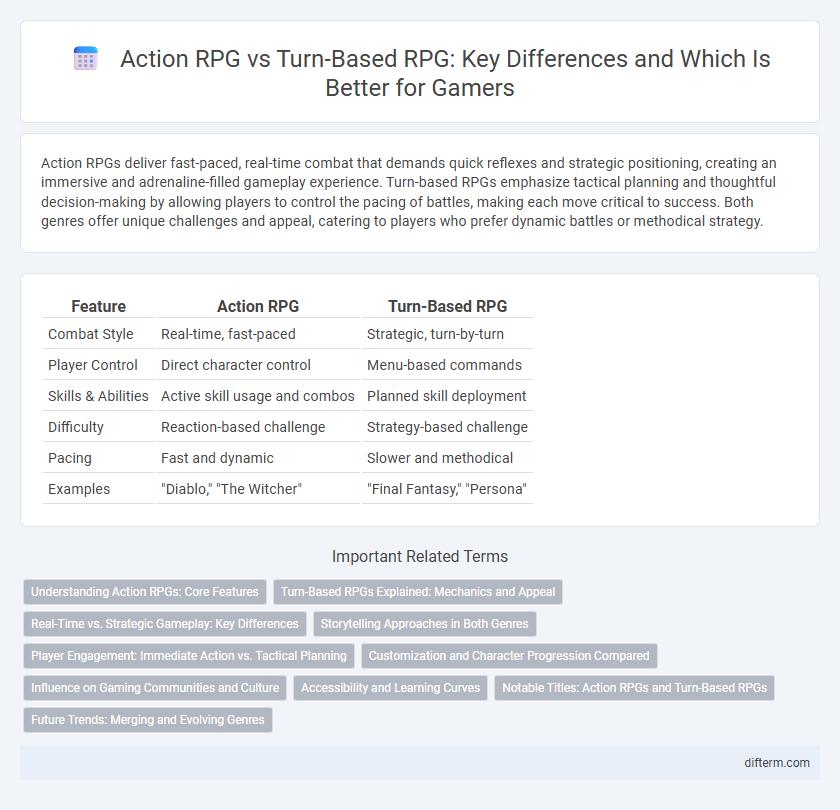Action RPGs deliver fast-paced, real-time combat that demands quick reflexes and strategic positioning, creating an immersive and adrenaline-filled gameplay experience. Turn-based RPGs emphasize tactical planning and thoughtful decision-making by allowing players to control the pacing of battles, making each move critical to success. Both genres offer unique challenges and appeal, catering to players who prefer dynamic battles or methodical strategy.
Table of Comparison
| Feature | Action RPG | Turn-Based RPG |
|---|---|---|
| Combat Style | Real-time, fast-paced | Strategic, turn-by-turn |
| Player Control | Direct character control | Menu-based commands |
| Skills & Abilities | Active skill usage and combos | Planned skill deployment |
| Difficulty | Reaction-based challenge | Strategy-based challenge |
| Pacing | Fast and dynamic | Slower and methodical |
| Examples | "Diablo," "The Witcher" | "Final Fantasy," "Persona" |
Understanding Action RPGs: Core Features
Action RPGs emphasize real-time combat requiring player dexterity and quick decision-making, blending fast-paced action with role-playing elements like character progression and item collecting. These games often feature dynamic environments and seamless exploration, allowing players to interact fluidly with the game world. Core features include responsive controls, skill-based mechanics, and an immersive narrative that evolves based on player actions.
Turn-Based RPGs Explained: Mechanics and Appeal
Turn-based RPGs feature strategic gameplay where players plan moves and attacks in a sequential order, emphasizing tactical decision-making over reflexes. This mechanics allow for deep character progression and complex storylines, appealing to players who enjoy thoughtful engagement and time to analyze scenarios. Popular franchises such as Final Fantasy and Persona showcase the genre's ability to blend immersive narratives with calculated combat systems.
Real-Time vs. Strategic Gameplay: Key Differences
Action RPGs emphasize real-time gameplay, requiring quick reflexes and continuous player input to navigate combat and exploration, creating a dynamic and immersive experience. Turn-based RPGs prioritize strategic decision-making, allowing players to plan moves carefully without time pressure, fostering thoughtful tactics over rapid reactions. This fundamental difference impacts pacing, player engagement, and the overall challenge, distinguishing real-time intensity from strategic depth.
Storytelling Approaches in Both Genres
Action RPGs immerse players in dynamic real-time combat, enhancing storytelling through immediate player decisions and visceral interactions that create a sense of urgency and involvement. Turn-based RPGs focus on deep narrative development and strategic pacing, allowing players to absorb story details and character arcs between thoughtfully planned moves. Both genres deliver compelling stories, with action RPGs emphasizing experiential immersion and turn-based RPGs highlighting elaborate plot progression.
Player Engagement: Immediate Action vs. Tactical Planning
Action RPGs heighten player engagement through fast-paced combat that demands instant reflexes and real-time decision-making, creating an adrenaline-fueled experience. Turn-based RPGs emphasize tactical planning, allowing players to strategize each move carefully within a structured timeframe, fostering deep analytical thinking and long-term strategy. Player preference often hinges on the desire for either immersive, continuous action or deliberate, methodical gameplay.
Customization and Character Progression Compared
Action RPGs offer real-time combat mechanics that emphasize fluid character control and adaptive skill usage, allowing players to customize abilities dynamically during gameplay. Turn-based RPGs provide structured character progression with intricate skill trees and deeper strategic planning, enabling precise customization through predefined development paths. Both genres focus on enhancing player agency but differ in pacing, with action RPGs favoring immediate decision-making and turn-based RPGs supporting thoughtful, long-term character optimization.
Influence on Gaming Communities and Culture
Action RPGs foster dynamic, real-time interactions that encourage fast-paced decision-making and create highly engaged gaming communities centered around skill mastery and live cooperation. Turn-based RPGs cultivate thoughtful strategy discussions and deep narrative analysis, attracting players who appreciate methodical planning and rich storytelling, thereby shaping a community focused on tactical depth and lore exploration. Both genres influence gaming culture by promoting distinct social interaction styles--action RPGs emphasize immediacy and reflexes, while turn-based RPGs highlight strategic patience and collective problem-solving.
Accessibility and Learning Curves
Action RPGs emphasize real-time combat mechanics that demand quick reflexes and hand-eye coordination, making them more accessible for players seeking immediate engagement and dynamic gameplay flow. Turn-based RPGs typically feature strategic, methodical combat systems requiring thoughtful decision-making and patience, which can present a steeper learning curve but appeal to players who enjoy deep tactical planning. Accessibility in action RPGs often benefits newcomers with intuitive controls and faster pacing, while turn-based RPGs challenge players with complex mechanics and slower progression that reward strategic mastery.
Notable Titles: Action RPGs and Turn-Based RPGs
Notable action RPGs like "The Witcher 3: Wild Hunt" and "Dark Souls" emphasize real-time combat and player reflexes, creating dynamic and immersive gameplay experiences. In contrast, turn-based RPGs such as "Final Fantasy VII" and "Persona 5" offer strategic depth through structured, tactical combat sequences that require careful planning. Both genres showcase rich storytelling and complex character development, appealing to different player preferences in the role-playing game community.
Future Trends: Merging and Evolving Genres
Future trends in gaming highlight the merging of action RPGs and turn-based RPGs, creating hybrid systems that blend real-time combat with strategic, turn-based decision-making. Developers are leveraging advanced AI and procedural generation to enhance player immersion and narrative complexity, pushing genre boundaries. Enhanced player customization and dynamic battle mechanics are shaping the evolution of RPGs, promising more engaging and versatile gameplay experiences.
action RPG vs turn-based RPG Infographic

 difterm.com
difterm.com